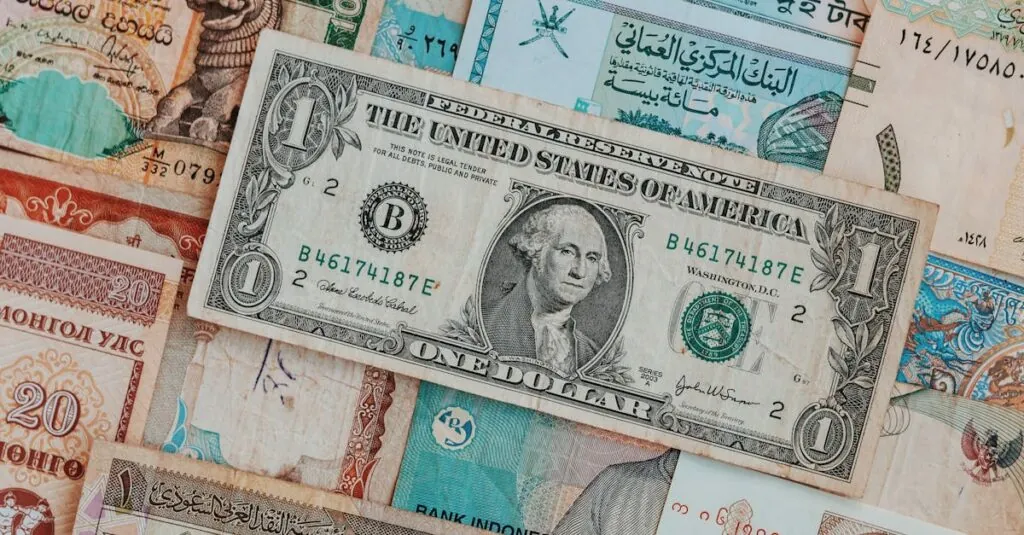Table of Contents
ToggleInvesting in foreign currency might sound like a thrilling adventure, like diving into a pool of money but with a twist of international flair. Picture this: you’re not just trading dollars; you’re flirting with euros, yen, and maybe even a few pesos. But before you pack your bags and head to the currency exchange, it’s crucial to know if this financial escapade is worth the risk.
While the allure of foreign currency trading can be tempting, it’s not all beach vacations and fancy cocktails. The market can be as unpredictable as a cat on a hot tin roof. With the right strategies and knowledge, however, investors can navigate these waters and potentially reap some rewards. So is it a good idea? Let’s dive deeper into the world of currency investing and uncover the truth behind this financial gamble.
Understanding Foreign Currency Investments
Investing in foreign currency entails trading different currencies to potentially make a profit. Many investors turn to this market to diversify their portfolios and capitalize on exchange rate fluctuations.
What Is Foreign Currency Investment?
Foreign currency investment involves purchasing one currency while simultaneously selling another. Investors participate in the forex market, where currencies are traded in pairs, such as USD/EUR or GBP/JPY. This trading allows for speculation on currency value changes. Profits arise from buying a currency at a lower price and selling it at a higher price. Market participants include individuals, corporations, and governments, all aiming to benefit from currency movement.
How Does It Work?
Forex trading occurs 24 hours a day, five days a week, across global financial centers. Traders utilize platforms to execute trades, often relying on leverage to maximize their positions. Exchange rates fluctuate based on economic indicators, geopolitical events, and market sentiment. Fundamental analysis examines economic data to predict movements, while technical analysis identifies trends through historical price charts. Successful traders balance these analyses to make informed decisions about buying or selling currencies.
Potential Benefits of Investing in Foreign Currency
Investing in foreign currency presents various advantages for investors. Below are some key benefits.
Diversification of Portfolio
Diversifying a portfolio can help reduce risk and enhance overall performance. Foreign currency investments allow traders to access global markets, reducing dependence on domestic assets. This exposure to multiple currencies can provide a buffer against fluctuations in local economies. For instance, if a domestic market underperforms, gains from foreign investments may offset losses. Incorporating currencies like the euro, yen, or pound can create balance and stability within a portfolio focused on traditional investments. Overall, foreign currency trading introduces an additional layer of diversification that can benefit long-term strategies.
Opportunities for High Returns
Opportunities for high returns frequently attract investors to foreign currencies. Currency values can fluctuate significantly within short time frames, creating chances for substantial profits. Leverage, often available in forex trading, amplifies these opportunities, allowing investors to control larger positions with smaller capital. A small price change in a currency pair can lead to large gains. For example, a trader investing in the USD/EUR pair can profit from even a minor shift in exchange rates. With a well-researched strategy, investors can capitalize on volatile markets, potentially yielding high returns on their investments. Various factors, such as interest rates and geopolitical events, can influence these opportunities, making informed decision-making crucial.
Risks and Challenges
Investing in foreign currency involves various risks and challenges that can significantly impact returns. Understanding these factors is crucial for making sound investment decisions.
Volatility of Currency Markets
Volatile conditions characterize currency markets, and exchange rates can swing dramatically within minutes. Such fluctuations create opportunities for profit but also introduce significant risk. For example, sudden geopolitical tensions can cause rapid declines in currency value, leading to steep losses. Many traders employ risk management strategies like stop-loss orders to mitigate these potential pitfalls. Navigating this volatility requires a strong grasp of market trends and quick decision-making skills. Recognizing that currency investors need to stay informed about real-time market developments remains essential.
Economic and Political Factors
Economic indicators play a pivotal role in currency valuation, with data such as inflation rates and GDP growth affecting market perceptions. Political stability is equally important; governments undergoing upheaval can lead to decreased investor confidence and drastic currency depreciation. Investors must monitor both domestic and international events, as changes in interest rates can trigger currency value shifts. Regularly analyzing reports from reputable financial institutions further aids in understanding these dynamics. Therefore, currency investors should pay close attention to economic policies and political climates to anticipate potential risks.
Strategies for Investing in Foreign Currency
Investing in foreign currency requires specific strategies for success. Understanding direct currency trading and utilizing effective forex trading platforms plays a crucial role.
Direct Currency Trading
Direct currency trading involves buying and selling currencies in pairs. Traders often focus on major currency pairs like USD/EUR or GBP/JPY due to their liquidity. Profits occur when an investor purchases a currency at a lower price and sells it at a higher price. Timing significantly impacts these transactions since currency values fluctuate unpredictably throughout the day. Staying informed about geopolitical events and economic indicators enhances an investor’s chance of making profitable trades. Maintaining a disciplined approach and establishing clear trading plans further contribute to successful outcomes in this fast-paced market.
Forex Trading Platforms
Forex trading platforms serve as essential tools for currency investors. They provide access to real-time market data and facilitate the execution of trades. Investors can choose between numerous platforms, each offering various features like mobile trading, charting tools, and analytics. User-friendliness often influences platform selection, as a seamless experience can enhance trading efficiency. Some platforms also offer demo accounts, allowing investors to practice trading strategies without risking real money. Careful comparison of fees, spreads, and available assets can lead to better trading conditions for investors engaging in foreign currency markets.
Making an Informed Decision
Making informed decisions about foreign currency investments requires careful consideration of several factors.
Assessing Your Risk Tolerance
Understanding personal risk tolerance is essential for investing in foreign currency. One way to assess this is by evaluating current financial circumstances and future goals. Assessing investment experience provides insights into comfort levels with volatility. An investor who prefers stability may opt for safer currency pairs, while a risk-tolerant individual could explore more volatile options. By setting realistic expectations, investors can align their strategies with their risk profile. Regularly revisiting and adjusting risk tolerance as market conditions change is crucial for long-term success.
Researching Currency Trends
Monitoring currency trends helps investors identify potential opportunities and threats. Tracking economic indicators such as inflation, interest rates, and employment figures aids in forecasting currency movements. Using resources like economic calendars keeps investors informed about upcoming data releases and geopolitical events that may impact currency values. Observing historical data allows traders to recognize patterns and adjust strategies accordingly. Investors can enhance decision-making by leveraging both fundamental and technical analyses, ensuring they remain proactive in a dynamic market.
Investing in foreign currency can be an enticing opportunity for those willing to embrace its complexities. With the potential for high returns and portfolio diversification, it offers unique advantages. However, the inherent risks and market volatility require careful consideration and strategic planning.
Successful investors understand the importance of staying informed about economic indicators and geopolitical events that influence currency values. By employing effective risk management strategies and utilizing the right trading platforms, they can navigate this dynamic market more effectively.
Ultimately, whether foreign currency investing is a good idea depends on individual risk tolerance and investment goals. With the right knowledge and approach, it can be a rewarding venture in the world of finance.







